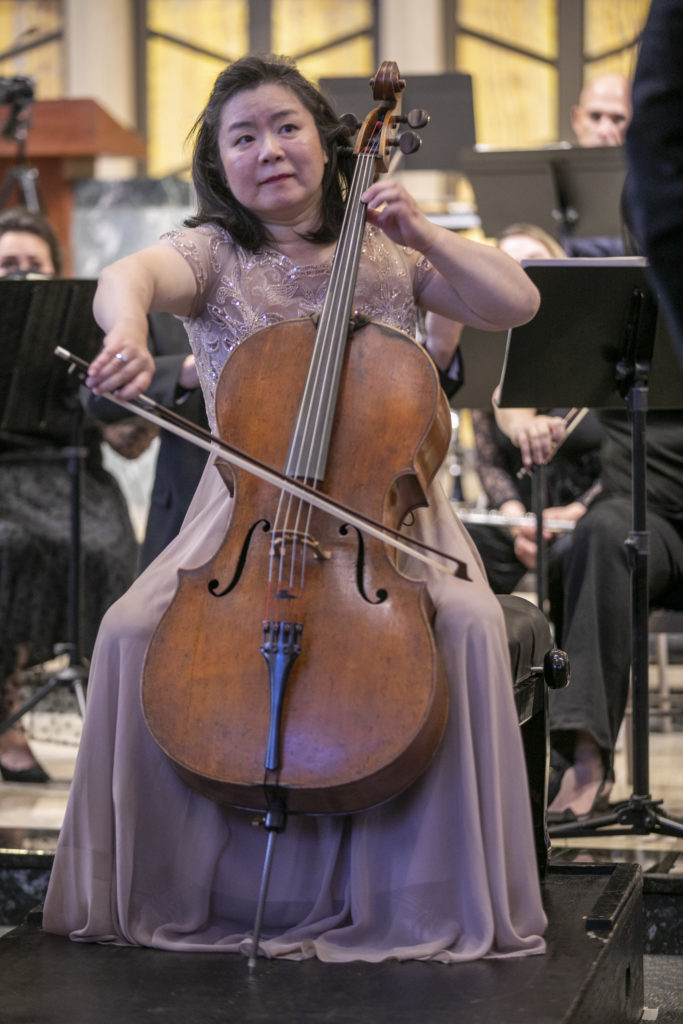Apollo Orchestra opens season with worthy Ravel and Tchaikovsky

Hai-Ye Ni performed Tchaikovsky’s Variations on a Rococo Theme with the Apollo Orchestra Sunday in Bethesda. Photo: Bruce Vartan Boyajian
The Apollo Orchestra’s Sunday afternoon concert at the Church of the Little Flower in Bethesda happened to occur on the birthday of one of its co-founders, Robert Downing. From the orchestra’s birth, it has been funded entirely by the Downing Family Foundation. The concert ended with a lavish orchestral rendition of “Happy Birthday,” with the audience invited to sing.
Even with wish lists and dropped hints, it’s tough to get everything you want for your birthday. On Sunday, two of the three Apollo performances merited effusive thank-you notes, while one might have occasioned a search for the gift receipt.
In Maurice Ravel’s Mother Goose Suite, flutist Ardyth Scott immediately captured the ear with a solo that sounded like the swooping fall of a leaf to open the suite’s first section, “Pavane of Sleeping Beauty.” Subsequent wind solos showed similar eloquence, with the orchestra’s music director and conductor, Stephen Czarkowski, minutely calibrating the strings’ dynamics to supply just the right sonic backdrop.
Concertmaster Claudia Chudacott make some extremely musical squeaks in “Tom Thumb” along with playing some affecting, melancholic solo lines, and “Empress of the Pagodas” felt like a toy box gone haywire in the best possible way. The orchestra supplied a glowing catharsis at the end of “The Fairy Garden,” an appropriate conclusion for this performance.
Despite its genre,Tchaikovsky’s Variations on a Rococo Theme for cello and orchestra doesn’t vary much in tempo or affect —and the soloist has to work to make this piece interesting.
On Sunday, Hai-Ye Ni, principal cellist of the Philadelphia Orchestra, took on this task by playing everything—even the most dilatory detours into high harmonics or show-offy multiple stops—in the most musical way possible while sustaining an even, gorgeous tone throughout. By doing so, she patiently developed a through-line that made this music seem better than it is, while not shortchanging the audience on virtuoso fireworks. Czarkowski and the orchestra provided able, alert accompaniment.
If an orchestra is going to perform Beethoven’s Fifth Symphony, as the Apollonians did to close Sunday’s concert, those most famous first four notes in the classical canon had better sound tight and powerful—the apocryphal “fate knocking at the door.” The Apollo strings didn’t quite agree on the tempo and duration of these notes, and made them sound mushy, dulling their impact.
Czarkowski and the orchestra had some moments of eloquence in this performance, especially in the Andante con moto. Yet the music blurred at several other crucial junctures. In the beginning of the trio in the third movement, the scampering unison in the lower strings came out wholly indistinct. In the finale, the jubilant ascending figures in the strings immediately after the opening fanfares became vague swirls, and in the coda there was a general sense of coming off the rails. At least the “Happy Birthday” that closed the afternoon came off well.
David Neely conducts the Apollo Orchestra with viola soloist Roberto Diaz October 30. apolloorchestra.com



